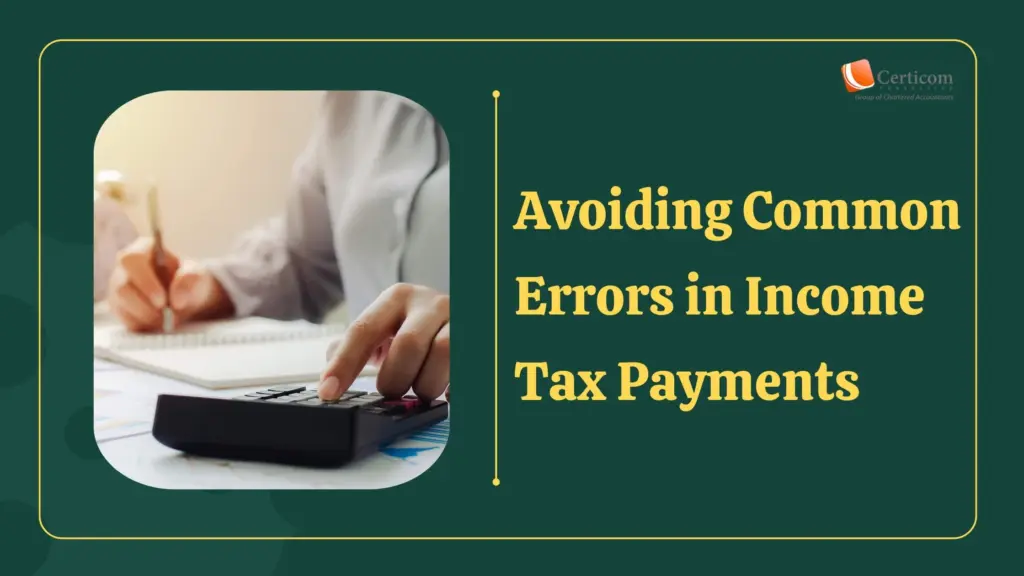Avoiding Common Errors in Income Tax Payments

Ensuring accurate and timely income tax payments is essential to avoid penalties and interest from the Income Tax Department. However, taxpayers often make mistakes that lead to compliance issues and unnecessary financial stress. This guide outlines common errors and practical steps to prevent them.
1. Failing to Check the Correct Tax Slabs and Rates
Misunderstanding the tax rates and slabs applicable to your income can result in incorrect tax liability calculations. Tax slabs vary based on income levels, age, and the nature of income, such as salary, business profits, or capital gains.
Steps to Prevent This Mistake:
- Regularly review updated tax slabs and rates applicable to your category.
- Seek guidance from a tax professional if you’re uncertain about your liability.

2. Overlooking Advance Tax Obligations
Taxpayers with business or professional income are often required to pay taxes in installments during the financial year. Missing advance tax payments can lead to penalties and interest.
How to Avoid This Error:
- Periodically assess your income to estimate your tax liability.
- Schedule reminders for advance tax due dates and make timely payments.
3. Using the Wrong Tax Payment Form (Challan)
Using an incorrect Challan form for your tax payments can cause delays and processing issues. For instance, confusion between forms for self-assessment tax, advance tax, or TDS can create problems.
Tips to Avoid This Mistake:
- Identify the appropriate Challan form for your tax type (e.g., Challan 280 for income tax, Challan 26QB for TDS on property transactions).
- Choose the correct payment mode, whether online or offline, as per your tax category.
4. Providing Incorrect Bank Account Information
Errors in bank account details, such as incorrect account numbers or IFSC codes, can result in payment failures or delays.
How to Prevent This Issue:
- Carefully verify all bank account details before making payments.
- Use pre-validated bank details wherever available to reduce errors.
5. Delaying Tax Payments
Procrastinating on tax payments can lead to accumulating penalties and interest. The longer the delay, the higher the additional costs.
How to Stay On Track:
- Plan your tax payments well ahead of due dates.
- Utilize e-filing platforms or set reminders to ensure timely payments.
6. Failing to Maintain Records of Tax Payments
Many taxpayers neglect to keep records of their tax payments, which can cause challenges during audits or when resolving discrepancies with the Income Tax Department.
Tips to Avoid This Problem:
- Store digital or physical copies of Challans, receipts, and payment confirmations.
- Regularly update your payment records, including online transaction details.

7. Entering Incorrect PAN Information
Providing an incorrect Permanent Account Number (PAN) while making payments can lead to processing errors and delays.
How to Avoid This Mistake:
- Verify your PAN details with the Income Tax Department to ensure accuracy.
- Double-check your PAN before submitting any tax payments.
Avoiding these common mistakes is essential for seamless tax compliance and minimizing penalties or interest. Accurate calculations, proper planning, and attention to detail can save you time and ensure hassle-free interactions with the Income Tax Department.
By following these guidelines, you can fulfill your tax obligations efficiently, avoid unnecessary financial stress, and stay compliant with tax laws.
Related Post
Cost Inflation Index for FY 2025-26: Impact on LTCG Tax
Loan Interest Deductions: How to Claim and Avoid Tax Scrutiny
Book A One To One Consultation Now For FREE
How can we help? *




